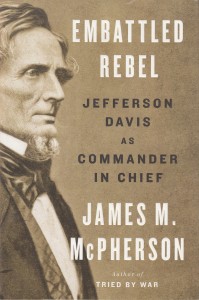Embattled Rebel: Jefferson Davis as Commander in Chief
Posted By Norman Gasbarro on October 1, 2014
From Penguin Press comes word that a new book about Jefferson Davis will be released on 7 October 2014. The book, by Prof. James M. McPherson, Embattled Rebel: Jefferson Davis as Commander in Chief, is a worthy companion to his earlier book, Tried by War: Abraham Lincoln as Commander in Chief. Although McPherson tries to “avoid the temptation to compare the two leaders,” readers of the book will undoubtedly do so, especially based on the new, sympathetic interpretation of Davis, which McPherson admits he came to somewhat surprisingly after his in-depth research into the available sources. His conclusion is “that while Davis did not win the war for the South, he was scarcely responsible for losing it.”
In the introduction, Prof. McPherson admits his biases and sympathies toward the Union and calls the reasons the South fought, to preserve slavery and break up the Union, as “tragically wrong.” But where Davis sits in history as a leader of a cause has been largely influenced by his hostile, Southern contemporaries who McPherson notes were of “large ego and small talents.” And, it is the refutation of that negative interpretation of Davis that this book intends to accomplish.
Readers of this blog should take note that a prior post here featured Davis. See: The Pennsylvania Ancestry of Jefferson Davis. But this new McPherson book deals little with Davis’s personal life or family ancestry, although often it is difficult to separate a personal past from present action. It is primarily a book about his role as Commander in Chief and how he oversaw five areas of activity, “policy, national strategy, military strategy, operations, and tactics.”
In analyzing Davis’s interactions with his generals, a background knowledge of each is essential to understand whether in each case of “large ego and small talents”, McPherson has proven his claim. End notes do provide evidence that he has consulted a wide range of both primary and secondary sources, particularly about each of the generals. In the case of John C. Pemberton, the Confederate general with Pennsylvania roots, there is a discussion of how he was perceived by Southerners because of those roots – and how Davis reacted to those criticisms. This war, between brothers (and sisters) and cousins, had many families split in the conflict. But it is not McPherson’s objective to delve into the personal lives and family ancestry of the generals, so he should not be faulted for failing to do so. That exercise is left to the reader, but certainly should not be ignored.
Does McPherson prove his thesis? Time will tell whether this new interpretation of Davis will become widely accepted. Nevertheless, this book is certainly worthy of a permanent place in the literature of the Civil War.
—————————-
The following is from the press release of the Penguin Group:
History has not been kind to Davis. Many Americans in Davis’s own time and in later generations considered him an incompetent leader, if not a traitor. Not so, according to James M. McPherson, the Pulitzer Prize-winning author of Battle Cry of Freedom. In Embattled Rebel, he argues that in order to understand the Civil War and its outcome, it’s essential to give Davis his due as a military leader and as the president of an aspiring Confederate nation.
Davis was a product of his time and circumstances, and to some extent his failure was inevitable from the beginning. His subordinates and enemies alike considered him difficult, egotistical, and cold. He was gravely ill throughout most of the war, often working from home and even from his sickbed, which no doubt had an impact on his performance. But Davis shaped and articulated the principal policy of the Confederacy with clarity and force: the quest for independent nationhood. Although he had not been a fire-breathing secessionist, once he committed himself to a Confederate nation he never deviated from this goal or compromised its purpose. In a sense, Davis was the last Confederate left standing in 1865.
When we fairly consider Davis as commander in chief, as the leader he was, it becomes clear that while he did not win the war for the South, he was not responsible for losing it.
 ;
;



Comments